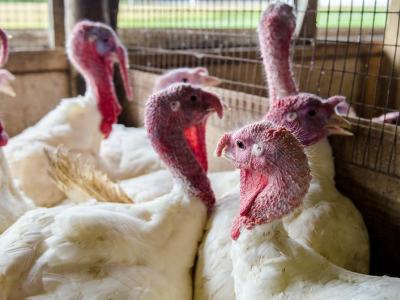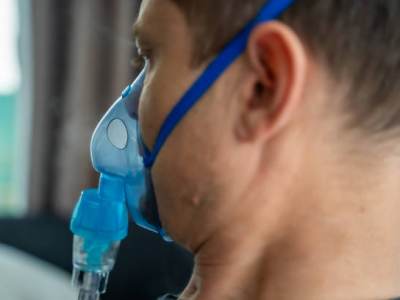CDC ends outbreak probe as Salmonella tied to pet turtles infects 10 more
A total of 76 people in 19 states have been sickened with Salmonella linked to pet turtles, according to a final investigation report today from the Centers for Disease Control and Prevention (CDC). That's 10 more cases in 1 more state compared with the CDC's previous update, which was in November.
Illnesses began from Mar 1, 2017, to Dec 1, 2017, and included 30 hospitalizations and no deaths. In interviews conducted as part of the outbreak investigation, 23 out of 60 people said they had contact with turtles or their environments, such as water from a turtle habitat, before getting sick.
Fourteen of the 23 people with turtle contact did so with small turtles, with shells of 4 inches or less that were sold from a street vendor. Whole-genome sequencing from isolates taken from ill people were closely related to the Salmonella Agbeni isolates from the turtles at the street vendor.
The CDC said in today's update, "This outbreak investigation is over. Illnesses could continue because people may not know they could get a Salmonella infection from contact with pet turtles."
Since 1975, the US Food and Drug Administration has prohibited the sale of small turtles because they are known to carry Salmonella.
Mar 13 CDC update
Bhutan reports H5N1 outbreak; Pakistan notes first H5N8 detection
Animal health officials in Bhutan today reported a highly pathogenic H5N1 avian flu outbreak in poultry, the first detection of the virus in the country since 2016, and Pakistan confirmed its first outbreak involving H5N8, which involved macaws at a zoo in Lahore.
In Bhutan, H5N1 struck free-range poultry raised on temple grounds in the city of Samdrup Jongkhar, located in the southeastern part of the country near the border with India, according to a report from the World Organization for Animal Health (OIE). The outbreak began on Mar 6, killing 36 of 60 birds. The remaining ones were culled.
An investigation found that the birds were brought in illegally from an unknown source and kept within the temple complex.
Meanwhile, Pakistan said the H5N8 outbreak in captive macaws at the Lahore zoo began on Jan 26 and killed two of five birds. The source of the virus hasn't been determined, the zoo has implemented movement restrictions within the facility, and provincial livestock departments have been asked to step up their field surveillance and reporting.
In other H5N8 developments, South Africa reported more outbreaks in wild birds and commercial ostriches, according to new reports from the OIE. The detections in wild birds all occurred on the Western Cape province coast from Jan 24 to Feb 21, mainly involving terns, but also cormorants and a spotted eagle-owl. The country also reported one more H5N8 outbreak on a commercial ostrich farm, which began on Jan 16 in Western Cape province, infecting 8 of 79 birds but causing no deaths.
Mar 13 OIE report on H5N1 in Bhutan
Mar 13 OIE report on H5N8 in Pakistan
Mar 13 OIE report on H5N8 in South African wild birds
Mar 13 OIE report on H5N8 in South African ostriches
Study find stroke risk increases after dengue infection
A patient's risk of stroke is elevated for 2 months after dengue infection, according to a study yesterday in the Canadian Medical Association Journal (CMAJ).
The study looked at more than 13,000 patients diagnosed as having dengue in Taiwan from 2000 through 2012. Patients with dengue were 2.49 times more likely to suffer from a stroke, either hemorrhagic or ischemic, within 60 days of diagnoses compared with controls. The overall incidence rate of stroke was 5.33 per 1,000 person-years in the dengue cohort, and 3.72 per 1,000 person-years in the control cohort.
The authors said the mechanism of dengue-related stroke is not yet clear, but likely related to endothelial dysfunction leading to plasma leakage and an inflammatory response.
"Dengue virus could infect immune cells, inducing complex cascades of inflammatory mediators, such as cytokines, chemokines and complement," the authors concluded. "Clinicians in dengue-endemic areas should be aware of this association, especially for patients with dengue who have neurologic deficits or for patients with stroke who have unexplained fever."
Mar 12 CMAJ study
New anthrax vaccine shows promise in preclinical trials
SparVax-L, a novel anthrax vaccine, was shown to be effective against anthrax in preclinical trials, according to Altimmune, Inc, an immunotherapeutics company in Gaithersburg, Md. SparVax-L performed similarly to BioThrax, the current approved anthrax vaccine.
To test efficacy, researchers challenged animals with fatal doses of anthrax. Animals that had one dose of SparVax-L had a 67% survival rate, and the survival rate climbed to 100% after two doses at day 0 and day 14, with the challenge occurring on day 28. The results were comparable to BioThrax's 96% survival rate after two doses.
"We are very encouraged by these data and look forward to continuing to develop this important vaccine," said William J. Enright, MBA, president and chief executive officer of Altimmune in a press release. "Nearly 700 volunteers have been dosed with a liquid formulation of this vaccine in previous Phase 1 and Phase 2 human studies. These data using a new, highly stable, lyophilized (freeze dried) formulation, continue to validate this approach and strongly support further development of SparVax-L."
SparVax-L is formulated with an adjuvant formulation that can be stored at room temperature.
Altimmune has developed the vaccine with funding from the National Institute of Allergy and Infectious Diseases and the Biomedical Advanced Research and Development Authority (BARDA).
Mar 13 Altimmune press release











